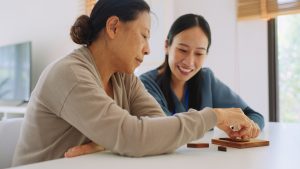Signs of Dementia
 Navigating life with dementia comes with its own unique set of challenges ranging from struggling to remember information that was once effortless to recall, to experiencing difficulties being able to express yourself. Everyday living may not resemble what it once was, but being educated on dementia makes navigating its waters much more manageable.
Navigating life with dementia comes with its own unique set of challenges ranging from struggling to remember information that was once effortless to recall, to experiencing difficulties being able to express yourself. Everyday living may not resemble what it once was, but being educated on dementia makes navigating its waters much more manageable.
There are a few different variations of dementia:
- Alzheimer’s disease, the most common dementia diagnosis, is usually associated with abnormal buildups of proteins in the brain.
- Lewy body dementia (LBD) includes problems with mood, behavior, thinking and movement. Individuals with LBD have abnormal amounts of a protein called alpha-synuclein in the brain, also known as Lewy bodies.
- Frontotemporal dementia (FTD) is one of the rarer forms of dementia and tends to pop up for individuals younger than 60. Changes in the frontal lobe may lead to difficulty with language and emotions, while changes in the temporal lobe may lead to behavioral symptoms.
- Vascular dementia is a diagnosis in people who experience vascular changes in the brain, such as a stroke or injury to blood vessels in the brain.
Getting a dementia diagnosis can be done by visiting your physician. Dementia gets progressively worse over time but staying organized can help mitigate some of its difficulties. To help you or a loved one manage living with dementia, here are some helpful tips:
- Make a list of groceries, and other items for everyday living and have them delivered.
- Write down important dates and events on a calendar or something easily visible.
- Remain physically and mentally active.
- Always carry a form of ID and make sure that people in your community are aware of your diagnosis.
- Discuss a care plan with your physician to go over strategies that can help.
For more information on community resources, contact a Community Resource Specialist at (408) 350-3200, option 1.
